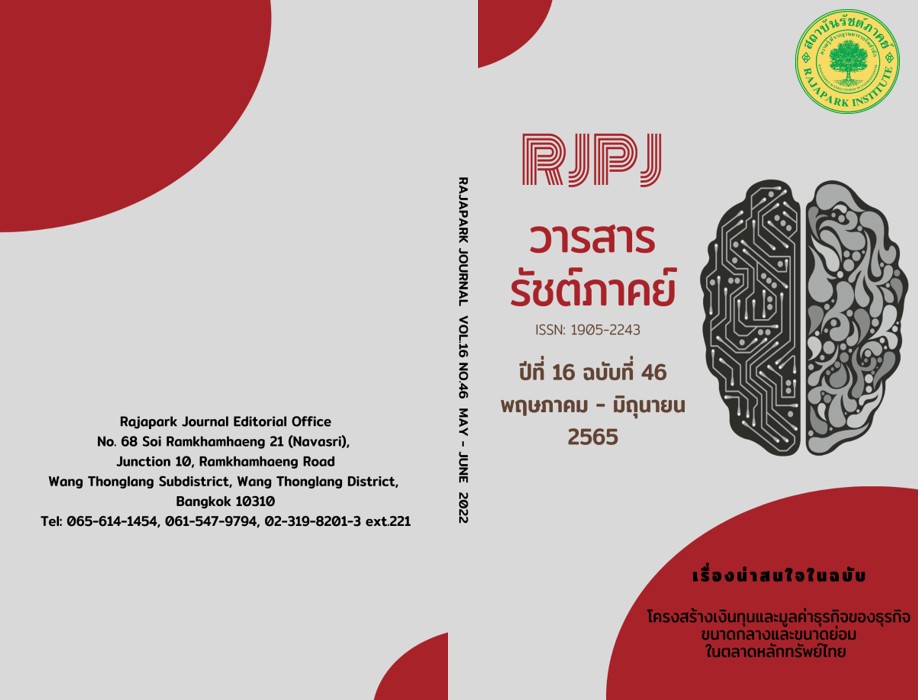Innovation Ecosystem in a School Aiming to Develop Student Innovators
Main Article Content
Abstract
The purpose of this research is to study the current state and future of the innovation ecosystem which aims to develop student innovators in Thailand and to draw and illustrate the figure of the future innovation ecosystem. A total of 17 participants were recruited from schools that had implemented an innovation ecosystem using purposive sampling by adopting a concept sampling strategy. This study used semi-structured interviews to collect data and implemented a research technique, known as Ethnographic Delphi Futures Research (EDFR) in which the analysis involved the median and interquartile range (IR). The results of this study showed that the innovation ecosystem consisted of three components: actors, activities, and artifacts. All of the opinions of the participants were consistent with each other in perceiving the significance of these three components at the highest level. Finally, the future of the innovation ecosystem still consisted of the same three components. Actors included school corporate executives who led the change in organizations, teachers whose roles were to change to facilitators and coaches, external experts who shared hands-on experiences, parents who deployed a tremendous force in producing student innovators, and external institutes who supplied substantial learning resources. The activities consisted of school management as a learning organization and curriculum and instructional management aimed at unlocking and developing the full potential of students. The artifacts included knowledge, learning resources, technology and platforms, collaborative networks, research, and intellectual properties.
Article Details

This work is licensed under a Creative Commons Attribution-NonCommercial-NoDerivatives 4.0 International License.
Views and opinions appearing in the Journal it is the responsibility of the author of the article, and does not constitute the view and responsibility of the editorial team.
References
Adner, R. (2006). Match Your Innovation Strategy to Your Innovation Ecosystem. Harvard Business Review, 84(4), 98-107, 148.
Autio, E., & Thomas, L. D. W. (2014). Innovation Ecosystems: Implications for Innovation Management? In M. Dodgson, D. M. Gann, & N. Phillips (Eds.), The Oxford Handbook of Innovation Management. Oxford University.
Barrett, P., Treves, A., Shmis, T., & Ambasz, D. (2019). The Impact of School Infrastructure on Learning: A Synthesis of the Evidence: World Bank Publications.
Cai, Y., Ma, J., & Chen, Q. (2020). Higher Education in Innovation Ecosystems. Sustainability, 12(11). https://doi.org/10.3390/su12114376
Colby, R. L. (2019). Competency-Based Education: A New Architecture for K-12 Schooling: Harvard Education.
Creswell, J. W., & Guetterman, T. C. (2020). Educational Research: Planning, Conducting, and Evaluating Quantitative and Qualitative Research, Global Edition: Pearson Higher Education & Professional Group.
Dyer, J., Dyer, J. M., Gregersen, H. B., & Christensen, C. M. (2011). The Innovator's DNA: Mastering the Five Skills of Disruptive Innovators: Harvard Business.
Gastaldi, L., Appio, F. P., Martini, A., & Corso, M. (2015). Academics as Orchestrators of Continuous Innovation Ecosystems: Towards a Fourth Generation of CI Initiatives. International Journal of Technology Management, 68(1-2), 1-20. doi:10.1504/IJTM.2015.068784
Gomes, L. A. d. V., Facin, A. L. F., Salerno, M. S., & Ikenami, R. K. (2018). Unpacking the innovation ecosystem construct: Evolution, gaps and trends. Technological Forecasting and Social Change, 136, 30-48. doi:10.1016/j.techfore.2016.11.009
Goyal, S., Chauhan, S., & Kapoor, A. (2020). Understanding the Challenges in the Research and Innovation Ecosystem in India. Paper presented at the The 21st Century from the Positions of Modern Science: Intellectual, Digital and Innovative Aspects, Cham.
Granstrand, O., & Holgersson, M. (2020). Innovation ecosystems: A conceptual review and a new definition. Technovation, 90-91, 102098. doi:10.1016/j.technovation.2019.102098
Jucevičius, G., & Grumadaite, K. (2014). Smart Development of Innovation Ecosystem. Procedia - Social and Behavioral Sciences, 156, 125-129. doi:10.1016/j.sbspro.2014.11.133
Krusuansombat, S. (2017). Visit Kamnoetvidya School, One of the hope toward 4.0. Thai Rath. https://www.thairath.co.th/news/900170
Office of the National Economic and Social Development. (2017). National Economic and Social Development Plan. https://www.nesdc.go.th/ewt_dl_link.php?nid=6422
Phoonphatarachiwin, C. (2003). Ethnographic Delphi Futures Research. Encyclopedia of Education, Srinakharinwirot University, 18(30), 97-100.
Portuguez Castro, M., Ross Scheede, C., & Gómez Zermeño, M. G. (2019). The Impact of Higher Education on Entrepreneurship and the Innovation Ecosystem: A Case Study in Mexico. Sustainability, 11(20). doi:10.3390/su11205597
Ruchiwit, M., Patchotasingh, M., & Phanphairoj, K. (2019). Strategies for Creating Innovators in Thailand’s Higher Education. Journal of Medical Education and Curricular Development, 6, 2382120519863078. doi:10.1177/2382120519863078
Senge, P. M. (1990). The Fifth Discipline: The Art and Practice of the Learning Organization. Doubleday/Currency.
Smith, E. E. (2021). P-20 Partnerships: A Critical Examination of the Past and the Future. Rowman & Littlefield.
Still, K., Huhtamäki, J., Russell, M. G., & Rubens, N. (2014). Insights for Orchestrating Innovation Ecosystems: the Case of EIT ICT Labs and Data-driven Network Visualisations. International Journal of Technology Management, 66(2-3), 243-265. doi:10.1504/IJTM.2014.064606
Strauss, A. L., & Corbin, J. M. (1998). Basics of Qualitative Research: Techniques and Procedures for Developing Grounded Theory: Sage Publications.
Uhl-Bien, M., Marion, R., & McKelvey, B. (2007). Complexity Leadership Theory: Shifting Leadership from the Industrial Age to the Knowledge era. The Leadership Quarterly, 18(4), 298-318. doi:10.1016/j.leaqua.2007.04.002
Tangkitvanich, S. (2019). “Innovators” Are Not Black Sheep, A Big Problem In Public Policy. Prachachat Business. https://www.prachachat.net/ict/news-327450
Wareham, J., Fox, P. B., & Cano Giner, J. L. (2014). Technology Ecosystem Governance. Organization Science, 25(4), 1195-1215. doi:10.1287/orsc.2014.0895
Weick, K. E. (1979). The Social Psychology of Organizing. McGraw-Hill.
World Economic Forum. (2018). The future of jobs report 2018. Cologyny/Geneva.


